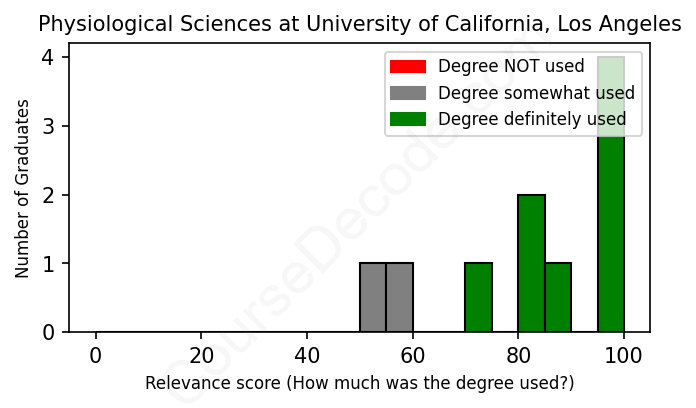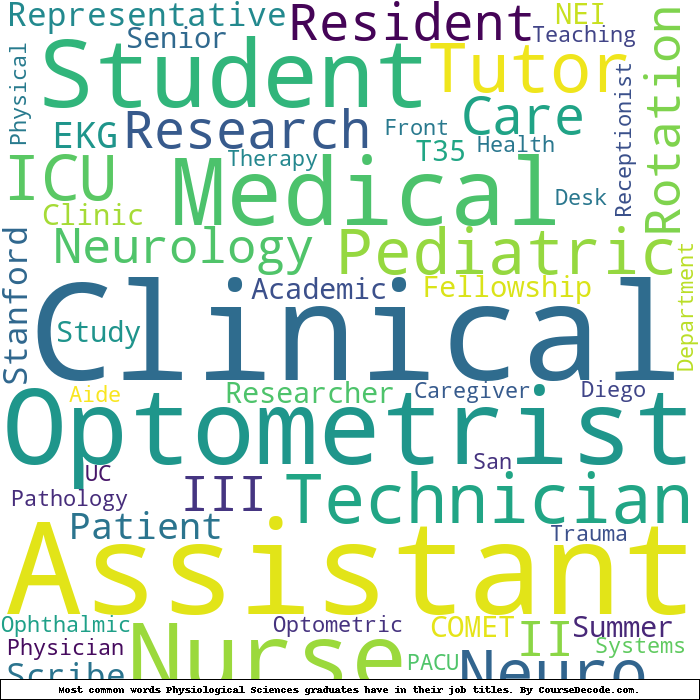
First, some facts. Of the Physiological Sciences graduates from University of California, Los Angeles we've analyzed , here's how many have used (or NOT used) their degree in their career:

These are estimates based on AI analysis of 10 LinkedIn profiles (see below).
The verdict? Significantly above average. Overall, with an average relevance score of 82%, Physiological Sciences graduates from University of California, Los Angeles have a much higher likelihood (+15%) of finding work in this field compared to the average graduate across all fields:
And for comparison, here's the chart for all profiles we've looked at across all degrees.
Also, after graduating, 70% of these graduates have pursued further education other than another Bachelor's degree (such as a Masters degree or other), compared to the average across all profiles of 35%. This suggests you may need more than just a Bachelors degree to be competitive as a Physiological Sciences graduate.
See the details:
|
Relevance score: 82% We think this person has gone into a career highly relevant to their degree. We think this person has gone into a career highly relevant to their degree.
DEGREE INFOGraduated in 2011 from University of California, Los Angeles with a Bachelor of Science - BS in Physiological Sciences. Also pursued further education since (see below). JOB HISTORY SINCE GRADUATIONPhysical Therapy Aide POGSON PHYSICAL THERAPY, INC. Jan 2012 - May 2016 Neuro/Trauma ICU Clinical Nurse II  UCLA Health Sep 2016 - Apr 2019 Neuro ICU Clinical Nurse II  UC San Diego Health Apr 2019 - May 2021 Neuro ICU Clinical Nurse III at UC San Diego Health Systems  UC San Diego Health May 2021 - Jun 2022 PACU Clinical Nurse III  UC San Diego Health Jun 2022 - Present FURTHER DEGREES DONE SINCE GRADUATINGMaster of NursingUCLA School of Nursing 2014 - 2016 ABOUT[NAME REMOVED] is a self-motivated and dedicated Registered Nurse with a passion for critical care. She is currently a Clinical Nurse III in the Neuro ICU with prior years of experience in the Neuro, Trauma, and Surgical ICU. [NAME REMOVED] is respected by her colleagues for her work ethic and character as a Charge Nurse, Resource Nurse, and clinical bedside nurse. She has successfully implemented sleep hygiene protocols in the ICU to decrease ICU delirium at both UCLA and UCSD Health. After competing for over 16 years as a competitive Junior Olympic and NCAA Gymnast, her leadership, time-management, and communication skills have allowed her to become a highly-skilled professional nurse and to be a primary contributor in the ICU. |
The top 10 most common jobs done by the graduates we've analyzed (ranked most common to least) are:
When looking at the career paths of graduates from UCLA's Physiological Sciences program, it’s clear that a wide range of jobs has emerged, but a few trends really stand out. Most notably, a significant number have moved into clinical roles, particularly in nursing, such as Neuro ICU Clinical Nurse positions. These roles leverage their education heavily and require an in-depth understanding of the physiological concepts learned during their degree. Other common jobs include optometry-related positions, where graduates use their knowledge to assess and treat eye-related conditions, thus applying their training in a very relevant way.
However, not every job held by these graduates is strictly aligned with the principles of physiological sciences. Some roles, like those of a Physical Therapy Aide or an Academic Tutor, seem to utilize only a fraction of the knowledge from their degree or focus more on general skills rather than specific physiological understanding. Still, many graduates have found themselves in positions that capitalize on their degree, especially in medical and clinical settings, making their overall career trajectory quite relevant to their studies at UCLA. It's a mixed bag, but definitely leans towards jobs where knowledge from their Physiological Sciences background shines.
Here is a visual representation of the most common words in job titles for Physiological Sciences graduates (this is across all Physiological Sciences graduates we've analyzed, not just those who went to University of California, Los Angeles):

Graduates from UCLA's Physiological Sciences program seem to have a pretty solid track record when it comes to launching their careers in health-related fields. A lot of them kick off their journey with roles that are directly related to healthcare, such as Physical Therapy Aide and Medical Assistant. For example, many of the recent grads are starting out as Medical Assistants or in technical roles like EKG Technicians. These positions typically serve as great stepping stones into more specialized careers, whether that's in nursing, optometry, or even research sectors.
As they gain experience, many of these alumni are climbing the ranks in the healthcare system. For instance, some have transitioned into nursing roles with significant advancements, such as becoming Clinical Nurse II and III within a few years of graduation. Others have pursued more specific paths in optometry or medicine, eventually landing positions as Pediatric Optometrists or Resident Physicians. Overall, it seems like while there may be some variance in job titles and roles undertaken—especially for those in the earlier years post-graduation—the trajectory for most appears to be favorable, steering them towards rewarding careers related to their studies in Physiological Sciences.
Honestly, a Bachelor’s degree in Physiological Sciences, especially at a school like UCLA, can be pretty challenging. It dives deep into complex topics like human biology, anatomy, and biochemistry, which can get pretty intense, especially if you’re not super into science. The coursework often involves a lot of rigorous classes, labs, and exams, so you'll need to put in a solid amount of study time and effort to keep up. While some students find their groove and get through it, others might feel overwhelmed at times. So, if you’re ready for some hard work and are passionate about the subject, it can be a rewarding journey, but definitely not a walk in the park!
Most commonly, in the LinkedIn profiles we've looked at, it takes people 4 years to finish a Bachelor degree in Physiological Sciences.
Looking at the job paths of these UCLA grads, it seems like they’re doing pretty well overall, especially those who graduated earlier. The ones working as nurses or optometrists likely have decent salaries, given that healthcare positions tend to pay well, especially with their experience levels climbing. For instance, the Clinical Nurse III roles and the Pediatric Optometrist positions suggest they’ve moved up the ladder credibly. However, some of the more recent grads have started in roles like medical assistants or clinical research students, which don’t typically offer high pay right off the bat. So, it looks like the longer you stick with it in the healthcare field, the more opportunity you’ll have to make some solid money!
Here is a visual representation of the most common words seen in the "about" section of LinkedIn profiles who have a Bachelor degree in Physiological Sciences (this is across all Physiological Sciences graduates we've analyzed, not just those who went to University of California, Los Angeles). This may or may not be useful:

Here are all colleges offering a Bachelor degree in Physiological Sciences (ordered by the average relevance score of their Physiological Sciences graduates, best to worst) where we have analyzed at least 10 of their graduates:
| College | Score | Count |
|---|---|---|
 University of California, Los Angeles University of California, Los Angeles
|
82 | 10 |